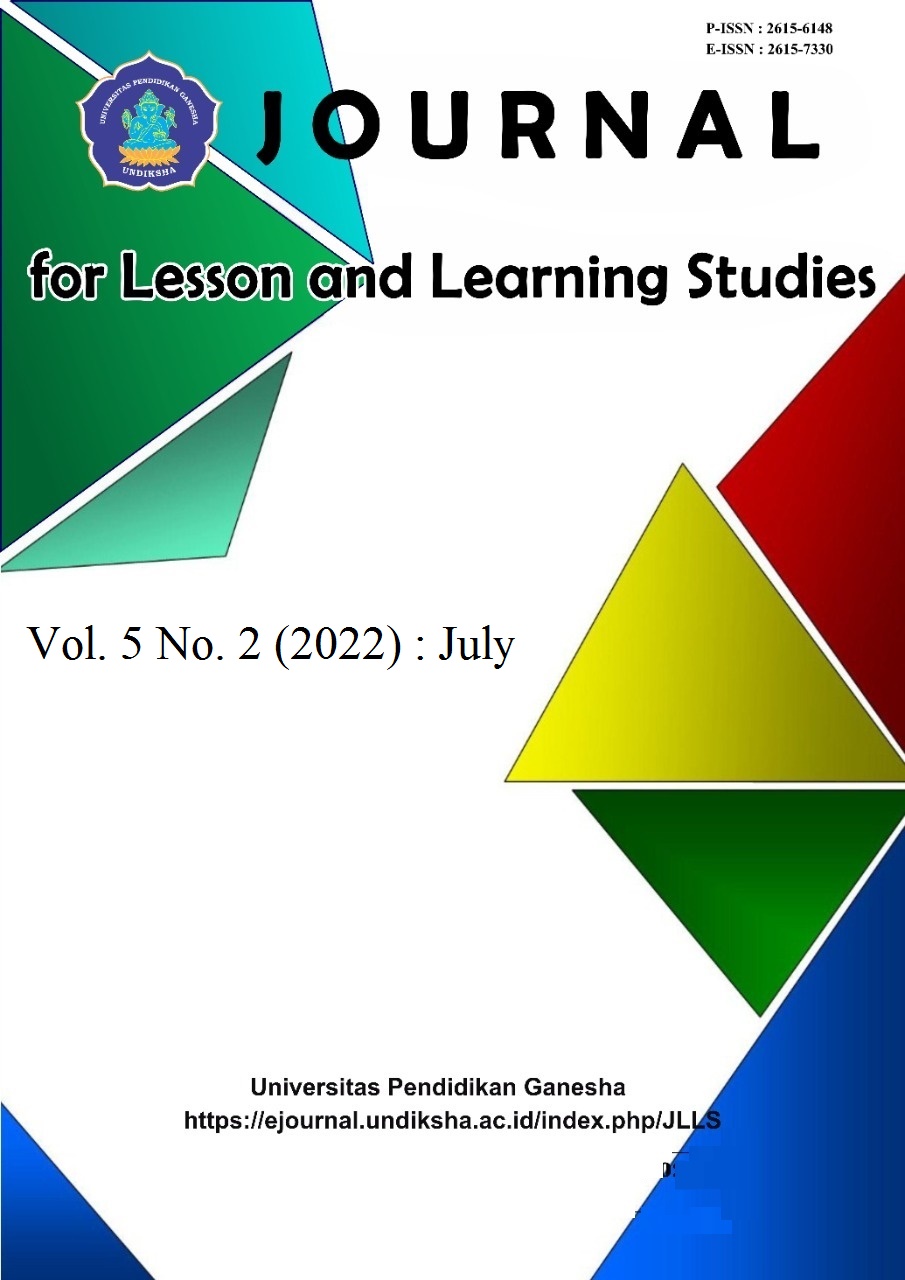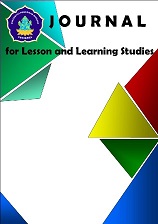Assessment Instruments of Caring Attitudes and Science Knowledge Competencies IV Grade Elementary School Student
DOI:
https://doi.org/10.23887/jlls.v5i2.52576Kata Kunci:
Assessment Instrument, Caring Attitude, Science CompetenceAbstrak
The attitude of students' concern for the surrounding environment is still relatively low, this is due to the lack of use of assessment instruments in assessing student attitudes. The purpose of this study is to analyses the design and tests the feasibility of the instrument of caring attitude and science knowledge competence. This research belongs to the type of development research, using the ADDIE development model. The subjects involved in this study were 2 lecturers and 3 fourth grade elementary school teachers. Data was collected using field study, observation, questionnaire, and test methods. The data obtained in the study were then analyzed by testing the validity and reliability of the instrument. The results of data analysis showed that the validation obtained an average percentage for the content aspect of 76.67% (adequate), the aspect of the social science technology model 80% (adequate), the format aspect 82% (very feasible), the language aspect 93% (very feasible) and 82% presentation aspect (very decent). Furthermore, the reliability test showed the results of the reliability coefficient values for the test instrument and the questionnaire instrument were 0.893 and 0.939, respectively. This value is in the range of 0.80 < r 1.00, this shows that the reliability of the two instruments used in this study is very high. Based on these results, it can be concluded that the assessment instrument for caring attitudes and science knowledge competencies are valid and reliable category so that it is very feasible to be developed and used in the learning process.
Referensi
Afrianda, R., Yolida, B., & Marpaung, R. R. (2019). Pengaruh Program Adiwiyata Terhadap Literasi Lingkungan dan Sikap Peduli Lingkungan. Jurnal Bioterdidik, 7(1), Hal. 32-42. http://jurnal.fkip.unila.ac.id/index.php/JBT/article/view/17117.
Anazifa, R. D., & Djukri. (2017). Project- based learning and problem- based learning: Are they effective to improve student’s thinking skills? Jurnal Pendidikan IPA Indonesia, 6(2), 346–355. https://doi.org/10.15294/jpii.v6i2.11100. DOI: https://doi.org/10.15294/jpii.v6i2.11100
Apriyana, A., Hasyim, A., & Sabdaningtyas, L. (2019). Pengembangan Instrumen Penilaian Sikap Sosial Pada Pembelajaran Tematik Subtema Ayo Cinta Lingkungan. Jurnal Pedagogi, 1(1). http://jurnal.fkip.unila.ac.id/index.php/pgsd/article/view/17504.
Büyükkarci, K. (2014). Assessment Beliefs and Practices of Language Teachers in Primary Education. International Journal of Instruction, 7(1), 107–120. https://dergipark.org.tr/en/pub/eiji/issue/5136/69989.
Fitri, S. F. N. (2021). Problematika Kualitas Pendidikan di Indonesia. Jurnal Pendidikan Tambusai, 5(1), 1617–1620. https://www.jptam.org/index.php/jptam/article/view/1148.
Hendriana, E. C., & Jacobus, A. (2017). Implementasi Pendidikan Karakter Di Sekolah Melalui Keteladanan Dan Pembiasaan. JPDI (Jurnal Pendidikan Dasar Indonesia), 1(2). https://doi.org/10.26737/jpdi.v1i2.262. DOI: https://doi.org/10.26737/jpdi.v1i2.262
Hermanto, B. (2020). Perekayasaan sistem pendidikan nasional untuk mencerdaskan kehidupan bangsa. FOUNDASIA, 11(2). https://doi.org/10.21831/foundasia.v11i2.26933. DOI: https://doi.org/10.21831/foundasia.v11i2.26933
Irawan, A. D. (2020). Nationalism in a State Based on Pancasila. Petita: Jurnal Kajian Ilmu Hukum Dan Syariah, 5(2), 133–144. https://doi.org/10.22373/petita.v5i2.85. DOI: https://doi.org/10.22373/petita.v5i2.85
Juliartini, N. M., & Arini, N. W. (2017). Penerapan Model Pembelajaran Nht Untuk Meningkatkan Hasil Belajar Ipa Siswa Kelas III. Journal of Education Action Research, 1(3), 240. https://doi.org/10.23887/jear.v1i3.12688. DOI: https://doi.org/10.23887/jear.v1i3.12688
Komara, E. (2018). Penguatan Pendidikan Karakter dan Pembelajaran Abad 21. SIPATAHOENAN: South-East Asian Journal for Youth, Sports & Health Education, 4(1), 17–26. https://doi.org/https://doi.org/10.2121/sip.v4i1.991.
Kuntoro, B. T., & Wardani, N. S. (2020). Pengembangan Instrumen Penilaian Sikap Sosial Pembelajaran Tematik Kelas III SD. Jurnal Ilmiah Wahana Pendidikan, 6(2), 163–175. https://doi.org/10.5281/zenodo.3752471.
Kurniawati, D., & Mawardi. (2021). Pengembangan Instrumen Penilaian Sikap Gotong Royong dalam Pembelajaran Tematik di Sekolah Dasar. Jurnal Ilmu Pendidikan, 3(3), 640–648. https://doi.org/10.31004/edukatif.v3i3.387. DOI: https://doi.org/10.31004/edukatif.v3i3.387
Mawardi, M. (2019). Rambu-rambu Penyusunan Skala Sikap Model Likert untuk Mengukur Sikap Siswa. Scholaria: Jurnal Pendidikan Dan Kebudayaan, 9(3), 292–304. https://doi.org/10.24246/j.js.2019.v9.i3.p292-304. DOI: https://doi.org/10.24246/j.js.2019.v9.i3.p292-304
Muftakim, H., & Hardini, A. T. A. (2021). Pengembangan Instrumen Penilaian Sikap Sosial Aspek Kerja Sama Pembelajaran Tematik Kelas IV SD. Jurnal Ilmiah Wahana Pendidikan, 7(4). https://doi.org/https://doi.org/10.5281/zenodo.5150347. DOI: https://doi.org/10.23887/jp2.v4i1.33352
Mustafa, P. S., & Masgumelar, N. K. (2022). Pengembangan Instrumen Penilaian Sikap, Pengetahuan, dan Keterampilan dalam Pendidikan Jasmani. Biormatika : Jurnal Ilmiah Fakultas Keguruan Dan Ilmu Pendidikan, 8(1), 31–49. https://doi.org/10.35569/biormatika.v8i1.1093. DOI: https://doi.org/10.35569/biormatika.v8i1.1093
Narut, Y. F., & Supradi, K. (2019). Literasi sains peserta didik dalam pembelajaran ipa di indonesia. Jurnal Inovasi Pendidikan Dasar, 3(1), 61–69. http://jurnal.unikastpaulus.ac.id/index.php/jipd/article/view/214.
Nugroho, A. N., & Airlan, G. . (2020). Pengembangan Instrumen Penilaian Keterampilan Berpikir Kritis Pembelajaran IPA Kelas 4 SD. Jurnal Ilmiah Pendidikan Profesi Guru, 3(3), 400–407. https://ejournal.undiksha.ac.id/index.php/JIPPG/article/view/29712. DOI: https://doi.org/10.23887/jippg.v3i3.29712
Nuroniyah, S. (2018). Pengembangan instrumen pengukuran sikap tanggung jawab siswa madrasah aliyah. Wiyata Dharma: Jurnal Penelitian Dan Evaluasi Pendidikan, 6(2), 134. https://doi.org/10.30738/wd.v6i2.3392. DOI: https://doi.org/10.30738/wd.v6i2.3392
Pane, A., & Dasopang, M. D. (2017). Belajar Dan Pembelajaran. FITRAH:Jurnal Kajian Ilmu-Ilmu Keislaman, 3(2), 333. https://doi.org/10.24952/fitrah.v3i2.945. DOI: https://doi.org/10.24952/fitrah.v3i2.945
Prasetya, B. (2020). Manajemen Teaching Factory Pada Era Industri 4 . 0 di Indonesia. Jurnal Bisnis & Teknologi, 12(01), 12–18. http://45.118.112.109/ojspasim/index.php/jbt/article/view/195.
Radia, E., & Aulia, W. (2021). Pengembangan Instrumen Penilaian Sikap Tanggung Jawab Pembelajaran Tematik Terpadu Kelas V SD. MIMBAR PGSD Undiksha, 9(1), 10. https://doi.org/10.23887/jjpgsd.v9i1.32979. DOI: https://doi.org/10.23887/jjpgsd.v9i1.32979
Raharjo, S. B. (2018). Evaluasi Trend Kualitas Pendidikan Di Indonesia. Jurnal Penelitian Dan Evaluasi Pendidikan, 16(2), 511–532. https://doi.org/10.21831/pep.v16i2.1129. DOI: https://doi.org/10.21831/pep.v16i2.1129
Ramdani, A., Jufri, A. W., Gunawan, G., Hadisaputra, S., & Zulkifli, L. (2019). Pengembangan Alat Evaluasi Pembelajaran Ipa Yang Mendukung Keterampilan Abad 21. Jurnal Penelitian Pendidikan IPA, 5(1). https://doi.org/10.29303/jppipa.v5i1.221. DOI: https://doi.org/10.29303/jppipa.v5i1.221
Sinaga, R. (2020). Pengembangan Instrumen Penilaian Sikap Mahasiswa PG-PAUD FIP Unimed dalam Pembelajaran Daring. Jurnal Usia Dini, 6(2), 1. https://doi.org/10.24114/jud.v6i2.22187. DOI: https://doi.org/10.24114/jud.v6i2.22187
Soeharto, Csapó, B., Sarimanah, E., Dewi, F. I., & Sabri, T. (2019). A review of students’ common misconceptions in science and their diagnostic assessment tools. Jurnal Pendidikan IPA Indonesia, 8(2), 247–266. https://doi.org/10.15294/jpii.v8i2.18649. DOI: https://doi.org/10.15294/jpii.v8i2.18649
Sujana, K., & Hariyadi, S. (2018). Hubungan Antara Sikap Dengan Perilaku Peduli The Relation Between Environmental Care Attitude And Behavior In. Jurnal Ecopsy, 5(2), 81–87. https://scholar.archive.org/work/kffzmbwgdvg65hloyuwtfhineu/access/wayback/https://ppjp.ulm.ac.id/journal/index.php/ecopsy/article/download/5026/pdf. DOI: https://doi.org/10.20527/ecopsy.v5i2.5026
Wahyuni, G., Ibnu, S., & Suharti, S. (2019). Perbedaan Pemahaman Konsep Siswa sebagai Hasil Penerapan Model Pembelajaran LC 5E-Analogi dan LC 5E. Jurnal Pendidikan: Teori, Penelitian, Dan Pengembangan, 4(4), 537. https://doi.org/10.17977/jptpp.v4i4.12361. DOI: https://doi.org/10.17977/jptpp.v4i4.12361
Wardani, R. K., & Syofyan, H. (2018). Pengembangan Video Interaktif pada Pembelajaran IPA Tematik Integratif Materi Peredaran Darah Manusia. Jurnal Ilmiah Sekolah Dasar, 2(4), 371. https://doi.org/10.23887/jisd.v2i4.16154. DOI: https://doi.org/10.23887/jisd.v2i4.16154
Widowati, A., Nurohman, S., & Anjarsari, P. (2017). Developing science learning material with authentic inquiry learning approach to improve problem solving and scientific attitude. Jurnal Pendidikan IPA Indonesia, 6(1), 32–40. https://doi.org/10.15294/jpii.v6i1.4851. DOI: https://doi.org/10.15294/jpii.v6i1.4851
Wulandari, R. (2017). Berpikir Ilmiah Siswa dalam Pembelajaran IPA Untuk Meningkatkan Literasi Sains. SEJ (Science Education Journal), 1(1), 29–35. https://doi.org/10.21070/sej.v1i1.839. DOI: https://doi.org/10.21070/sej.v1i1.839
Yusup, F. (2018). Uji Validitas dan Reliabilitas Instrumen Penelitian Kuantitatif. Jurnal Tarbiyah : Jurnal Ilmiah Kependidikan, 7(1). https://doi.org/10.18592/tarbiyah.v7i1.2100. DOI: https://doi.org/10.18592/tarbiyah.v7i1.2100
Unduhan
Diterbitkan
Cara Mengutip
Terbitan
Bagian
Lisensi
Hak Cipta (c) 2022 Luh Gede Ayu Rusiana Dewi, I Made Gunamantha, I Made Citra Wibawa

Artikel ini berlisensiCreative Commons Attribution-ShareAlike 4.0 International License.
Authors who publish with the Journal for Lesson and Learning Studies agree to the following terms:
- Authors retain copyright and grant the journal the right of first publication with the work simultaneously licensed under a Creative Commons Attribution License (CC BY-SA 4.0) that allows others to share the work with an acknowledgment of the work's authorship and initial publication in this journal.
- Authors are able to enter into separate, additional contractual arrangements for the non-exclusive distribution of the journal's published version of the work (e.g., post it to an institutional repository or publish it in a book), with an acknowledgment of its initial publication in this journal.
- Authors are permitted and encouraged to post their work online (e.g., in institutional repositories or on their website) prior to and during the submission process, as it can lead to productive exchanges, as well as earlier and greater citation of published work. (See The Effect of Open Access)





